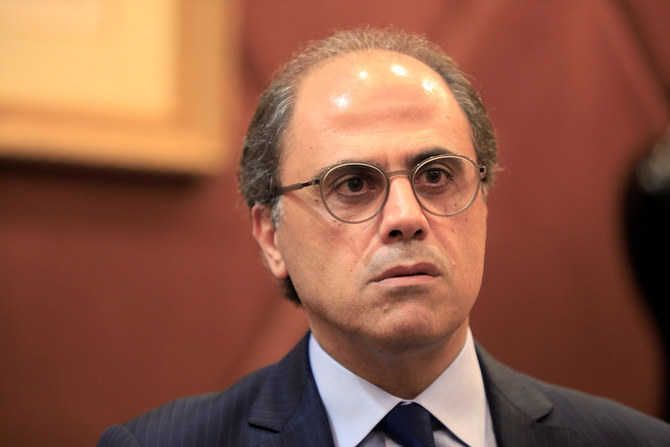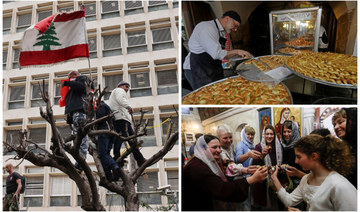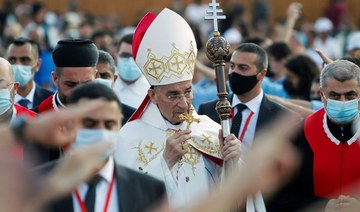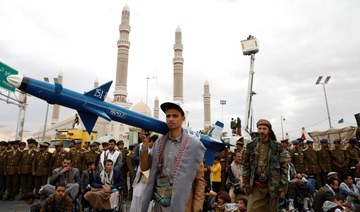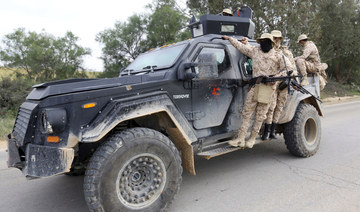BEIRUT: News emerged on Sunday that the largest Christian blocs in the Lebanese parliament — the Free Patriotic Movement, the Lebanese Forces, and the Lebanese Phalanges Party — were moving toward reaching a consensus on a presidential candidate.
Among the likely names suggested for the role is former Finance Minister Jihad Azour, 57.
Azour currently serves as the director of the Middle East and Central Asia Department at the International Monetary Fund.
Maronite Patriarch Bechara Al-Rahi made a possible reference to the consensus in his Sunday sermon on the eve of his trip to the Vatican and then to Paris.
Al-Rahi expressed hope that a president of the republic would be elected as soon as possible so that the constitutional institutions could be organized.
He said: “We thank God for what we hear about some consensus among parliamentary blocs regarding the future president, so that he does not pose a challenge to anyone, and at the same time possesses a personality that responds to Lebanon’s needs today and inspires internal and external confidence.”
Al-Rahi hoped the “chaos occurring at several levels” would also stop soon.
Hezbollah and the political coalition allied with it support the nomination of Sleiman Frangieh, leader of the Marada Party who is close to the Syrian regime, but most Christian parliamentary blocs in Lebanon reject him.
Mohammed Raad, Hezbollah’s parliamentary bloc chief, reacted to the possibility of the Christian parliamentary blocs reaching a consensus on Azour as their candidate.
Raad said in a statement on Sunday that “the candidate whose name is circulating is a maneuvering candidate whose mission is to confront the candidate we support and to undermine him.”
He called on the other group “to stop wasting time and prolonging the deadline.”
The presidential vacuum in Lebanon will enter its eighth month on June 1 after 11 parliamentary election sessions failed to enable a presidential candidate to reach the second round of the presidential elections due to a lack of quorum.
Opposition forces to Hezbollah previously insisted on nominating MP Michel Mouawad, but Hezbollah considered him an “inflammatory candidate.”
A political analyst stated that Azour did not want to be a “confrontational or challenging candidate.”
The Lebanese media reported that Azour said he “wants to be the president who carries a rescue project for the country with the approval of everyone.”
The political analyst was cautious about “considering Azour as a final candidate for the Christian blocs, in anticipation of any surprises or changes in positions at the last moment.”
He, however, praised what he saw as the positive direction achieved so far.
MP Elias Hankash, who is involved in the negotiations, said that the chances of electing a president soon had improved.
He also said that name of former Minister Azour was among the names agreed upon by the Free Patriotic Movement.
Hankash said: “There is an insistence that we cannot devote the presidency to Hezbollah.”
He emphasized that “we want an acceptable candidate who has the specifications that we do not compromise on, and we see that the country cannot tolerate settlements, and we are not talking today about a settlement but about accepting a candidate.
“There are principles that many have died for, and a settlement occurs when we give up on principles, but when we agree on a name, this is not called a settlement.”
MP George Okais, a former judge and member of the Lebanese Forces party, spoke of progress in the negotiations between the opposition and the Free Patriotic Movement, without yet reaching an agreement on a unified name.
Okais said he expected that next week could be a turning point in this direction.
He pointed out that the proposal of Azour came as a result of an agreement with the Free Patriotic Movement on a non-provocative name for the Hezbollah team.
At the same time, he said the name could unify the ranks of the opposition, “so we have gone halfway, waiting for the other team.”
Ali Hassan Khalil, a member of the Amal Movement bloc, believes that “the logic of political forces coming together only to obstruct the candidate we supported cannot lead our country to safety.”
He added: “When we supported a candidate for the presidency (Frangieh), we were guided by deep convictions that we wanted a president who could manage national consensus.”
Hashem Safieddine, head of Hezbollah’s executive council, said: “There is no way to reach a president of the republic except through consensus.”
Safieddine added: “This is Lebanon, and this is its nature, and this is how the solutions are in it.”
Maronite Patriarchate spokesperson Walid Ghayad said on Sunday that Al-Rahi was heading to the Vatican on Monday to meet with Prime Minister Cardinal Pietro Parolin.
He will then travel to Paris to meet with French President Emmanuel Macron on Tuesday.
According to Ghayad, Al-Rahi will ask for France’s assistance in the Syrian refugee issue in Lebanon and the necessity of their return to their country, in addition to addressing financial matters, especially in light of the economic crisis.
Azour coordinated the implementation of important reform initiatives when he served as the finance minister from 2005 to 2008.
Before and after this tenure, he held several positions in the private sector.
They include working at McKinsey & Company and Booz & Company, where he was a senior partner and executive adviser.
Before joining the IMF in March 2017, he was a managing partner at the consulting and investment firm Infinity Partners for investment and business consulting.



